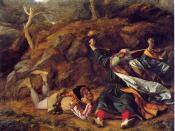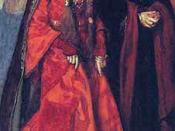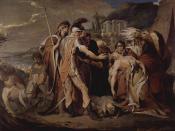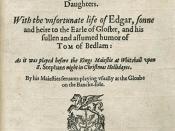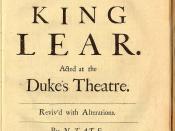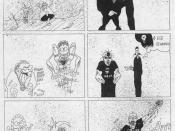King Lear can be valued in different ways and for different reasons. The story of King Lear encompasses many different ideas and themes pertaining to the central and sub plots. Whilst there are many different ways of reading Shakespeare's King Lear there are three prevalent readings in which to observe the main idea's put across. These readings are a family reading, a nihilistic reading and a Christian reading. There are three main scenes wherein these readings are portrayed. Fundamental themes in King Lear include justice, authority versus chaos, reconciliation.
A family reading focuses mainly on relationships between characters and the individual psyches in comparison with each other. King Lear starts his tragedy by trying to quantify the love of his three daughters " Which of you shall we say doth love us most. That we our largest bounty may extend.""Love is whatever you can still betray. Betrayal can only happen if you love."
(John LeCarre) In In King Lear the characters are betrayed by the closest people to them. The parents betray their children, mostly unintentionally. The children deceive their parents because of their greed and power hunger. Their parents were eventually forgiven, but the greedy children were not. Parents and their children betray one and other, and are only able to do so because they are family, however, the children betray for greed while the parents betray through the credulity caused by their children's greed. Family Drama is present in King LearAct I opens in an unadorned red room lit by candles and torches and furnished only with a table and chairs; sitting or standing around the table are men and women in plain neck-to-toe black, gray, or scarlet costumes. Though the Eyre adaptation forsakes lavish background trappings, the souls of the characters are richly embellished with the full gamut of human emotions. The question of Edmund's presence during the love auction represents another important factor in a family reading. He is shown at the end of the scene to have been eavesdropping from behind a door. This contributes furthermore to a family reading of the play, it signifies family relationships when it comes to secrets and betrayals.
Nihilism refers to the total and absolute destructiveness, esp. toward the world at large and including oneself and the notion of nothingness or nonexistence. In a nihilistic reading of the play the main focus's are the amoral destructiveness of Edmund, Cornwall, Goneril and Regan, the rejection of established laws and institutions by the bastard Edmund, the eventual denial of all real existence by Lear.
Brook's film is a devastating realisation of the play: a pitiless examination of the cruelty and emptiness that lies at the heart of the lust for power. But it is by no means a nihilistic portrayal of humanity. It breaks your heart not because it unflinchingly reveals how cruel human beings can be - that would be merely horrifying - but because it reveals the fragile human possibility that is destroyed by this cruelty.
In King Lear, Shakespeare shows us humanity at its most abject, and - almost miraculously - a great beauty shines within its abjection. When Lear, at the height of his madness and humiliation, prays for those who "bide the pelting of this pitiless storm", lamenting their "loop'd and window'd raggedness", it is a plea to all of us to "show the heavens more just". As too often in this world, the heavens remain unjust: but within that prayer is the awakening of a true compassion that illuminates the value of all real justice.
And maybe that compassion might awaken within those who listen to Lear's speech. That we might "see better" is, after all, what art might legitimately offer us: a slight hope perhaps but, all the same, real and obdurate in a world which so often seeks to make us blind.
The barren setting also incorporated the importance of nothingness in existential theory. Nothingness appears in existentialism, as the placeholder of possibility. It is only once Lear experiences nothingness in the storm scene that he is able to question his existence in a meaningless decomposing universe and learn forgiveness.
In the storm scene the storm itself and Lear's madness are emphasized by increasingly surrealistic images, such as the ground cracking open, walls bursting and flames among branches. These images symbolize the disintegration of Lear's world and dramatizes the scene to emphasize the storm that rages in Lear's mind that causes him to question his valuesKing Lear is a perfect demonstration of the great consequences one man's actions can cause. The element of Christianity enters here, because King is a God-appointed position, not to be given up. Lear, however, decides to disregard this fact, instead focusing on the immediate gratification he will receive from his daughters, and boosting his self-esteem while making him feel loved. Lear essentially offers his land and power for love, "Which of you shall we say doth love us most? That we our largest bounty may extend where nature doth with merit challenge," forgoing his God-given position and rights.
Next enters the punishment, seemingly brought about by "God". Because Lear has disregarded God's wishes, he is made to suffer insanity and excruciating physical torment. Lear is even given multiple opportunities to revoke his decision, but rather than heed the advice of those trying to help him, he banishes them for questioning his selfish decision. This leaves Lear surrounded by the people looking only to better themselves by using the now vulnerable Lear.
Lear is estranged from his kingdom and friends, causing his loss of sanity. In the midst of Lear's self-pity he is discovered by the fool. Fittingly enough the fool is the one able to lead Lear back to the normal world. He is made to appreciate the people who truly cared about him from the beginning. He sees thâÂÂat they were right all along, and repents from his foolish decision, though it's too late to do him any good.
Once more, the consequences of Lear's single sin are felt. In a typically Christian or hopeful ending, King Lear would learn to listen to the caring friends he has, and become less selfish. Shakespeare, however, chooses not to end it so predictably or simply. Even after all of Lear's suffering and repenting, he continues to receive punishment. Cordelia, who he has now realized truly loved him most, is killed. Lear is left feeling hopeless, saying, "I know when one is dead, and when one lives. She's dead as earth," which seems slightly to refer to his now cynical view of the earth.
In the end, all of Lear's suffering can be traced back to his first and biggest mistake in the play. He is forced to live with this mistake to the bitter end, in this case, the end of his life. Lear is "old now, and these same crosses spoil (him)." After having gone through the worst, it becomes obvious to the reader that Lear has come to an understanding with "God", in this instance the personification of religion. This provides not hope for the reader, but rather teaching.
Shakespeare, William. King Lear (New Folger Library Shakespeare). New York: Washington Square Press, 2004.
